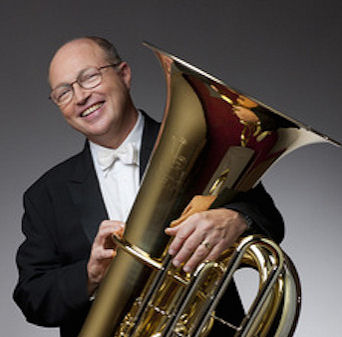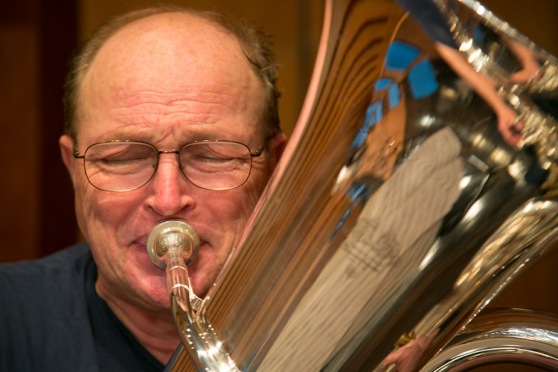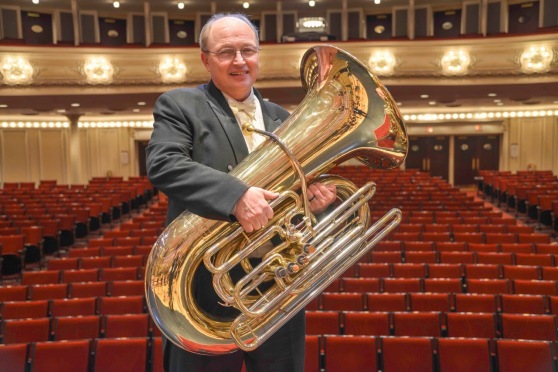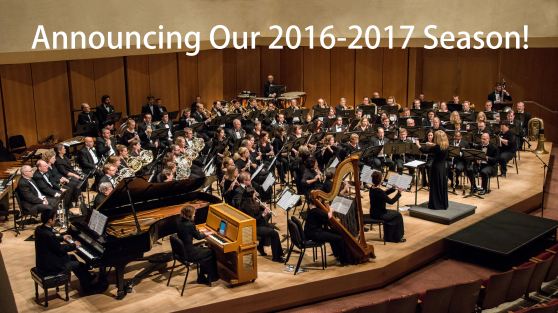The Northshore Concert Band is honored to welcome Guest Soloist Gene Pokorny, Principal Tuba Of The Chicago Symphony Orchestra for the first concert of our 61st season! Widely considered the finest tuba player in the world today, our November 6, 2016 concert, entitled Reflections, marks his first solo performance with the Northshore Concert Band!
Before joining the Chicago Symphony Orchestra he was tuba player in the Israel Philharmonic, the Utah Symphony, the St. Louis Symphony and the Los Angeles Philharmonic. In addition to playing film scores in Hollywood such as Jurassic Park and The Fugitive, he is a member of the Union Pacific (Railroad) Historical Society and spends time as a “foamer” (watching and chasing trains) as well as a card-carrying member of The Three Stooges Fan Club.

Northshore Concert Band member Paul Bauer recently interviewed Gene Pokorny. Below is part one of this fascinating peek into the life of this remarkable musician.
Please tell us a bit about your journey through trumpet, saxophone, and clarinet to the tuba.
My dad was a trumpet player. I followed in his footsteps and picked up the trumpet soon after I had started on piano. I started on the wrong foot by using too much mouthpiece pressure and was very tense. My dad knew this was not right so I switched to saxophone. Soon thereafter I switched to clarinet. When I was in 8th grade, the tuba player in the junior high band was graduating and they needed somebody to play. When you’re sitting in a junior high clarinet section, the sounds are enough to make you start to see dead relatives…and my sounds were at least as bad as my clarinet-playing schoolmates. So moving to the tuba at the back of the band room was the easy way out especially since it was also closest to the back door and a quick escape to snack period. Eventually, I stuck with the tuba into high school. At one point, one of the tuba players in the high school band said he wanted to have a brass quintet play at the Moravian Church of Downey where his dad was the reverend. When we played at the church, I noticed the choir director pick up a trombone and started to play during the offertory. I thought he sounded good and I told him. I found out the next week that Jeff Reynolds (the choir director) had just won the Los Angeles Philharmonic bass trombone job!! So I started to really get interested in low brass instruments. I took some bass trombone lessons from him. I realized right away that I would never, ever, ever become as good as he was on bass trombone. So I thought it would be better to stick with the tuba. I took some lessons from him, and eventually he said I should take some tuba lessons from Roger Bobo [tubist in the Los Angeles Philharmonic]. So I did. I was getting hooked big time. I started to listen to Roger Bobo’s recordings. While I was impressed with his playing, my goal was to become a high school band director as a rebellion against my really diminutive high school music program: 2,300 students in the high school and we had 25 people in the band. It was next to nothing and very depressing. I kept the playing up but my main goal was to become a band director. I was a music education major when I first went to college at the University of Redlands. Everything changed however on the night of May 13, 1973. A visiting orchestra came to San Diego which some of my pals at Redlands and I attended. It was the Chicago Symphony Orchestra conducted by Georg Solti playing Mahler Symphony #5. That evening made a big difference in my outlook. I decided to take the plunge and try to become a professional performer and leave the band director goals behind. I transferred to the University of Southern California, because Tommy Johnson taught there. He was the final word as far as learning how to play the tuba in Southern California although I still took lessons from Roger Bobo. In the spring of 1975, I received a call from Bobo who said that there was a tuba position open in the Israel Philharmonic. He thought I should audition for it. I would be playing for Zubin Mehta [Music Director of the Los Angeles Philharmonic and Conductor/Music Advisor of the Israel Philharmonic]. It was pretty easy to drive to the audition site at the Los Angeles Music Center. The trombone section from the LA Philharmonic listened along with Mehta to me and a couple other players. Mehta had some other people to listen to in other cities. I drove back to USC and continued my day. It was about two weeks later that I got a call from Bobo, who said that Mehta wanted me for the Israel Philharmonic and I should give him a call at a hotel in Italy. I was on cloud nine. I gave him a call and I got a contract in the mail. [Gene graduated from USC and then began playing with the Israel Philharmonic in 1975].
What do you enjoy most about your life as a musician?
While I very much enjoy being on stage playing in the orchestra, I really enjoy playing recitals, picking my own repertoire, and having the privilege of introducing new music, old music, abused music and/or unused music, to people. I like the opportunity to be able to stand in front of an audience and open the musical doors wide and be welcoming so people can relate to what they are about to listen to. I think it’s really important to do that. If you are playing a great piece of music, serve it on bona fide china rather than on a paper plate. It will make it seem more special to the people listening. By telling just a few facts about the music or the composer at the time of his writing a piece, you can greatly enhance the perception of how the piece is heard.

CSO tuba Gene Pokorny hits a few high notes in warm up before a concert in Brescia. © Todd Rosenberg Photography 2012
Please share a bit about memorable experiences you have had playing in bands.
My high school experience with bands was very unrewarding. I learned that it could have been much different and a lot better when I went to several summer music camps. One was at the Idyllwild School of Music and Arts [now called the Idyllwild Arts Academy]. The band director when I was there was Benton Minor [who taught at the California State University – Fullerton]. He was a highly-disciplined task master who insisted that you always show up at least 10 minutes before rehearsal and that you always have a rehearsal pencil. If not, you would suffer. That was not a threat; that was a promise. There have been times when I left for rehearsal here [CSO], and if I discovered that I did not have my rehearsal pencil with me, I would go home to get it. It was better than being guilt-ridden. The lasting impression I had of Benton Minor was the idea of a pyramidal sense of balance, where the bottom register is the strongest and most reliable in pitch and rhythm. Consequently, the highest notes in the ensemble are of lesser importance. I heard this idea espoused by W. Francis MacBeth [renowned wind composer] and Clarence Sawhill [band director at UCLA] who taught at Arrowbear Music Camp in California. I thought that’s the way an orchestra should be balanced. I later found out that that is what George Szell brought to the Cleveland Orchestra. Anyway, after my orchestra career started, I really missed playing in band and its repertoire – Gustav Holst’s Military Suites, Ralph Vaughan Williams’ Toccata Marziale, H. Owen Reed’s La Fiesta Mexicana, music of Roger Nixon, etc. The only band repertoire that made it onto the orchestra stage was when Erich Leinsdorf conducted the St. Louis Symphony in an orchestral version of Karel Husa’s Music for Prague 1968, which I remember from high school honor band. There have been times when I have gone incognito in some local community bands either hiding in the tuba section or hiding in the third clarinet section.

What have been some of your musical influences?
Majors influences (some retired/late) include:
Larry Johansen – taught tuba at University of Redlands when I first arrived there in 1971.
Jeff Reynolds (bass trombone – Los Angeles Philharmonic, choir director – Moravian Church of Downey, California). Influential teacher, hero. He was my model.
Roger Bobo (tuba – Los Angeles Philharmonic) The singularly most distinctive tuba sound around. He is to tuba as Pavarotti was to being a tenor.
Tommy Johnson (tuba – Los Angeles studios) Influential teacher during formative time. Crown prince of the low register.
Red (David) Lehr (sousaphone – St. Louis; traditional jazz, ragtime, dixieland) I don’t know of a player who plays any smoother. Red is the most amazing legato tuba player I have ever heard, and his main influence was Pete Fountain (iconic New Orleans traditional jazz clarinetist)
Mordechai Rechtman (Principal bassoon – Israel Philharmonic) He could completely control the orchestra with his instrument from where he was sitting.
George Silfies (Principal clarinet – St. Louis Symphony) A consummate musician.
Arnold Jacobs (tuba – Chicago Symphony) had a distinctive sound and tension-less approach.
Floyd Cooley (tuba – San Francisco Symphony) Had a solo sound that offered another approach for me from my earliest influences
Rex Martin (Professor of tuba – Northwestern University) I’d describe him as a young and vital Arnold Jacobs with an amazingly large tool box to help fix playing problems.
Warren Deck (tuba – New York Philharmonic) Is probably my favorite orchestral tuba player.
Larry Combs (Principal clarinet – Chicago Symphony) One of those players who never failed to take my breath away.
Steve (Stephen) Williamson (Principal Clarinet – Chicago Symphony Orchestra) I never thought I’d hear anyone as good as that.
Michael Mulcahy (trombone – Chicago Symphony Orchestra) The only predictable thing about Mulcahy’s playing is that it is unpredictable. When I attend a recital of his, I know I am going to have an exciting ride.
Please join us on Sunday, November 6, 2016 at 3:00 pm at Pick-Staiger Concert Hall, Northwestern University; 50 Arts Circle Drive in Evanston, Illinois for Reflections, conducted by Artistic Director Mallory Thompson, and featuring guest soloist Gene Pokorny, Principal Tuba of the Chicago Symphony Orchestra!
Program highlights will include:
Elegy – John Barnes Chance
Gene Pokorny, tuba soloist
o Turbulence – Bruce Broughton
o Over the Rainbow – Harold Arlen/arr. Alan Morrison/trans. Joseph Kreines
Festive Overture – Dmitri Shostakovich/arr. Donald Hunsberger
October – Dmitri Shostakovich/arr. Preston Mitchell
Ticket Information:
Individual concert tickets are $20 each, seniors $15, students/children $10.To make these unforgettable performances accessible for music lovers of all ages we offer special group rates to groups of 10 or more. Call us at 847-432-2263 or email adam@northshoreband.org to customize your group ticket package today!
Tickets are available in advance or at the box office on the day of the concert.
The box office opens at 2:00 pm on the day of the concert.
For More Information:
Visit www.northshoreband.org or call (847) 432-2263.









